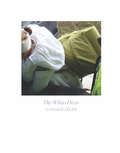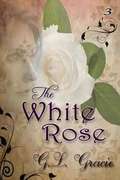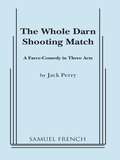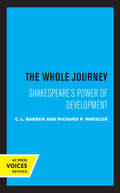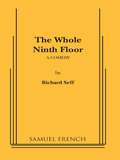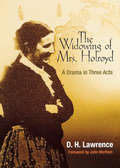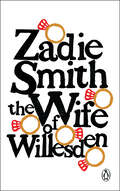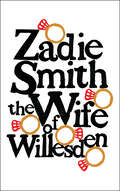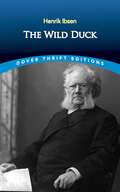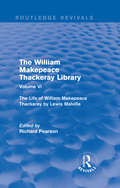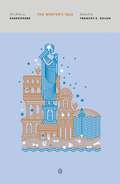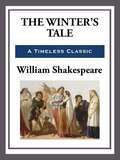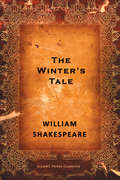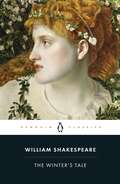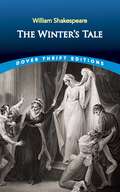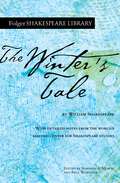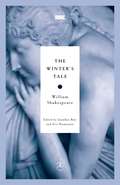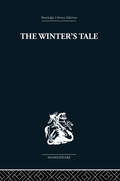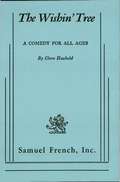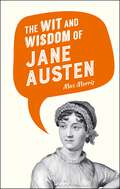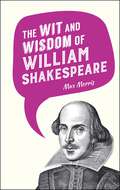- Table View
- List View
The White Dress
by Nathalie LégerThe third in Nathalie Léger&’s acclaimed genre-defying triptych of books about the struggles and obsessions of women artists. The White Dress is the third in Nathalie Léger's award-winning triptych of books about women who &“through their oeuvre, transform their lives into a mystery&” (ELLE). In Exposition, Léger wrote about the Countess of Castiglione, the most photographed woman of the nineteenth century; in Suite for Barbara Loden she took up the actress and filmmaker Barbara Loden; here, Léger grapples with the tragic 2008 death of Italian performance artist Pippa Bacca, who was raped and murdered while hiking from Italy to the Middle East in a wedding dress to promote world peace. A harrowing meditation on the risks women encounter, in life and in art, The White Dress also brings to a haunting conclusion Léger's personal interrogation—sustained across all three books—of her relationship with her mother and the desire for justice in our lives.
The White Rose
by Lillian Garrett-GroagThe White Rose was written by Lillian Garrett-Groag and premiered in 1991 at the Old Globe Theatre in San Diego, Calif. The play chronicles the arrest, interrogation and eventual execution of a group of University of Munich students who protested the Nazi regime at the height of World War II.
The Whole Darn Shooting Match: A Farce-Comedy in Three Acts
by Jack PerryZany exploits, hilarious antics and wild ideas follow fast and furiously throughout this comedy about the advertising world. It is set in the Creative Room where a flamboyant TV commercial writer, an alcoholic artist, a flippant girl Friday, and their beloved leader, the Creative Director, engage in a running feud with the new president of the company, an efficiency expert, the office boy and everyone else who dares to interfere with their off beat rules of office conduct.
The Whole Journey: Shakespeare's Power of Development
by C. L. Barber Richard P. WheelerThis title is part of UC Press's Voices Revived program, which commemorates University of California Press’s mission to seek out and cultivate the brightest minds and give them voice, reach, and impact. Drawing on a backlist dating to 1893, Voices Revived makes high-quality, peer-reviewed scholarship accessible once again using print-on-demand technology. This title was originally published in 1986.
The Whole Ninth Floor
by Richard SeffComedy / 6m, 5f / Interior / Across the street from the ‘mad men’ of Madison Avenue live the Ten Percenters of the National Talent Agency. It’s the same time, 1962, a secretary is still a toy, boys will still be boys, but the times they are a changin’. Audiences will love to hear what’s happening on The Whole Ninth Floor / “First impression is that it is a string of jokes tied together rather loosely. A moment’s concentration brings home however the basic fact that Seff weaves a story based on the young man’s intense and insistent desire to do the right thing. The laughs come fast, and they are plentiful.” - The Patterson Call
The Widowing of Mrs. Holroyd
by D. H. LawrenceThe Widowing of Mrs. Holroyd is one of D. H. Lawrence's most significant early works, first published in 1914.
The Wife of Willesden
by Zadie SmithZadie Smith's first time writing for the stage, a riotous twenty-first century translation of Geoffrey Chaucer's classic The Wife of Bath&“Married five times. Mother. Lover. Aunt. Friend. She plays many roles round here. And never Scared to tell the whole of her truth, whether Or not anyone wants to hear it. Wife Of Willesden: pissed enough to tell her life Story to whoever has ears and eyes . . .&” In her stage-writing debut, celebrated novelist and essayist Zadie Smith brings to life a comedic and cutting twenty-first century translation of Geoffrey Chaucer&’s classic The Wife of Bath. The Wife of Willesden follows Alvita, a Jamaican-born British woman in her mid-50s, as she tells her life story to a band of strangers in a small pub on the Kilburn High Road. Wearing fake gold chains, dressed in knock-off designer clothes, and speaking in a mixture of London slang and patois, Alvita recalls her five marriages in outrageous, bawdy detail, rewrites her mistakes as triumphs, and shares her beliefs on femininity, sexuality, and misogyny with anyone willing to listen. A thoughtful reimagining of an unforgettable narrative of female sexual power, written with singular verve and wit, The Wife of Willesden shows why Zadie Smith is one of the sharpest and most versatile writers working today.
The Wife of Willesden
by Zadie SmithZadie Smith's first time writing for the stage, a riotous twenty-first century translation of Geoffrey Chaucer's classic "The Wife of Bath"&“Married five times. Mother. Lover. Aunt. Friend. She plays many roles round here. And never Scared to tell the whole of her truth, whether Or not anyone wants to hear it. Wife Of Willesden: pissed enough to tell her life Story to whoever has ears and eyes...&” In her stage-writing debut, celebrated novelist and essayist Zadie Smith brings to life a comedic and cutting twenty-first century translation of Geoffrey Chaucer&’s classic The Wife of Bath. The Wife of Willesden follows Alvita, a Jamaican-born British woman in her mid-50s, as she tells her life story to a band of strangers in a small pub on the Kilburn High Road. Wearing fake gold chains, dressed in knock-off designer clothes, and speaking in a mixture of London slang and patois, Alvita recalls her five marriages in outrageous, bawdy detail, rewrites her mistakes as triumphs, and shares her beliefs on femininity, sexuality, and misogyny with anyone willing to listen. A thoughtful reimagining of an unforgettable narrative of female sexual power, written with singular verve and wit, The Wife of Willesden exemplifies why Zadie Smith is one of the sharpest and most versatile writers working today.
The Wild Duck: A Play In Five Acts (classic Reprint) (Dover Thrift Editions: Plays)
by Henrik IbsenThe idealistic son of a corrupt merchant exposes his father's duplicity, but in the process destroys the very people he wishes to save. Gregers Werle forces his friends, the Ekdals, to confront the truth about their lives -- but the truth only serves to wound them further.
The William Makepeace Thackeray Library: Volume VI - The Life of William Makepeace Thackeray by Lewis Melville (Routledge Revivals: The William Makepeace Thackeray Library)
by Richard PearsonFirst published in 1996, The William Makepeace Thackeray Library is a collection of works written by and about the novelist. This sixth volume contains the work of Lewis Melville, one of the most productive biographers and critics of Thackeray at the turn of the 20th century. Richard Pearson’s helpful introduction not only provides additional information on the biographer himself, but also analyses the text and tracks its development over time. This book will be of interest to those studying Thackeray and nineteenth-century literature.
The Winter Weather Machine
by Anne Flounders Jessica Wolk-Stanley Dori ButlerNIMAC-sourced textbook
The Winter's Tale
by William Shakespeare Stephen Orgel A. R. Braunmuller Frances E. Dolan"I feel that I have spent half my career with one or another Pelican Shakespeare in my back pocket. Convenience, however, is the least important aspect of the new Pelican Shakespeare series. Here is an elegant and clear text for either the study or the rehearsal room, notes where you need them and the distinguished scholarship of the general editors, Stephen Orgel and A. R. Braunmuller who understand that these are plays for performance as well as great texts for contemplation." (Patrick Stewart) The distinguished Pelican Shakespeare series, which has sold more than four million copies, is now completely revised and repackaged. Each volume features: * Authoritative, reliable texts * High quality introductions and notes * New, more readable trade trim size * An essay on the theatrical world of Shakespeare and essays on Shakespeare's life and the selection of texts
The Winter's Tale
by William Shakespeare Stephen Orgel A. R. Braunmuller Frances E. DolanThe acclaimed Pelican Shakespeare series edited by A. R. Braunmuller and Stephen Orgel The legendary Pelican Shakespeare series features authoritative and meticulously researched texts paired with scholarship by renowned Shakespeareans. Each book includes an essay on the theatrical world of Shakespeare’s time, an introduction to the individual play, and a detailed note on the text used. Updated by general editors Stephen Orgel and A. R. Braunmuller, these easy-to-read editions incorporate over thirty years of Shakespeare scholarship undertaken since the original series, edited by Alfred Harbage, appeared between 1956 and 1967. With definitive texts and illuminating essays, the Pelican Shakespeare will remain a valued resource for students, teachers, and theater professionals for many years to come. For more than seventy years, Penguin has been the leading publisher of classic literature in the English-speaking world. With more than 1,700 titles, Penguin Classics represents a global bookshelf of the best works throughout history and across genres and disciplines. Readers trust the series to provide authoritative texts enhanced by introductions and notes by distinguished scholars and contemporary authors, as well as up-to-date translations by award-winning translators.
The Winter's Tale
by William ShakespeareRunning an emotional gamut from betrayal and broken hearts to romance and reconciliation, this 1611 tragicomedy begins with the tyrannical actions of a jealous king, whose baseless suspicions destroy his own family. The play's second half takes place 16 years later, when the lively plot takes a lighthearted turn, abounding in song and dance.
The Winter's Tale
by William ShakespeareKing Leontes is cursed to have no heir until his long-abandonded child is returned to his kingdom.
The Winter's Tale
by William Shakespeare'The work of Shakespeare is virtually infinite' Jorge Luis BorgesA jealous king, convinced that his wife has been unfaithful and is having another man's baby, imprisons her and puts her on trial. The child is abandoned to die, but when she is found and raised by a shepherd, it seems redemption may be possible. A bravura blend of tragedy, comedy and romance, Shakespeare's emotionally potent late play explores artifice and nature, mortality and renewal, and the destructive and consoling effects of time.Used and Recommended by the National TheatreGeneral Editor Stanley Wells Edited by Ernest Schanzer Introduction by Russ McDonald
The Winter's Tale (Dover Thrift Editions: Plays)
by William ShakespeareRunning an emotional gamut from betrayal and broken hearts to romance and reconciliation, this 1611 tragicomedy begins with the tyrannical actions of a jealous king, whose baseless suspicions destroy his own family. The play's second half takes place 16 years later, when the lively plot takes a lighthearted turn, abounding in song and dance.
The Winter's Tale (Folger Shakespeare Library)
by William ShakespeareThe authoritative edition of The Winter&’s Tale from The Folger Shakespeare Library, the trusted and widely used Shakespeare series for students and general readers.The Winter&’s Tale, one of Shakespeare&’s very late plays, is filled with improbabilities. Before the conclusion, one character comments that what we are about to see, &“Were it but told you, should be hooted at / Like an old tale.&” It includes murderous passions, man-eating bears, princes and princesses in disguise, death by drowning and by grief, oracles, betrayal, and unexpected joy. Yet the play, which draws much of its power from Greek myth, is grounded in the everyday. A &“winter&’s tale&” is one told or read on a long winter&’s night. Paradoxically, this winter&’s tale is ideally seen rather than read—though the imagination can transform words into vivid action. Its shift from tragedy to comedy, disguises, and startling exits and transformations seem addressed to theater audiences. This edition includes: -Freshly edited text based on the best early printed version of the play -Full explanatory notes conveniently placed on pages facing the text of the play -Scene-by-scene plot summaries -A key to the play&’s famous lines and phrases -An introduction to reading Shakespeare&’s language -An essay by a leading Shakespeare scholar providing a modern perspective on the play -Fresh images from the Folger Shakespeare Library&’s vast holdings of rare books -An annotated guide to further reading Essay by Stephen Orgel The Folger Shakespeare Library in Washington, DC, is home to the world&’s largest collection of Shakespeare&’s printed works, and a magnet for Shakespeare scholars from around the globe. In addition to exhibitions open to the public throughout the year, the Folger offers a full calendar of performances and programs. For more information, visit Folger.edu.
The Winter's Tale (Modern Library Classics)
by William Shakespeare Jonathan Bate Eric RasmussenOne of the last plays Shakespeare penned on his own, The Winter's Tale is a transcendent work of death and rebirth, exploring irrational sexual jealousy, the redemptive world of nature, and the magical power of art.Under the editorial supervision of Jonathan Bate and Eric Rasmussen, two of today's most accomplished Shakespearean scholars, this Modern Library series incorporates definitive texts and authoritative notes from William Shakespeare: Complete Works. Each play includes an Introduction as well as an overview of Shakespeare's theatrical career; commentary on past and current productions based on interviews with leading directors, actors, and designers; scene-by-scene analysis; key facts about the work; a chronology of Shakespeare's life and times; and black-and-white illustrations. Ideal for students, theater professionals, and general readers, these modern and accessible editions from the Royal Shakespeare Company set a new standard in Shakespearean literature for the twenty-first century.From the Trade Paperback edition.
The Winter's Tale (The New Cambridge Shakespeare)
by William Shakespeare edited by Susan Snyder Deborah T. Curren-AquinoThe Winter's Tale is one of Shakespeare's most varied, theatrically self-conscious, and emotionally wide-ranging plays. This 2007 edition provides a newly-edited text, a comprehensive introduction that takes into account current critical thinking, and a detailed commentary on the play's language designed to make it easily accessible to contemporary readers. Much of the play's copiousness inheres in its generic intermingling of tragedy, comedy, romance, pastoral, and the history play. In addition to dates and sources, the introduction attends to iterative patterns, the nature and cause of Leontes' jealousy, the staging and meaning of the bear episode, and the thematic and structural implications of the figure of Time. Special attention is paid to the ending and its tempered happiness. Performance history is integrated throughout the introduction and commentary. Textual analysis, four appendices - including the theatrical practice of doubling, and a select chronology of performance history - and a reading list complete the edition.
The Winter's Tale: A Commentary on the Structure
by Fitzroy PyleFirst published in 1969. Critics have in the past described The Winter's Tale as a work of "haphazard structure". More recent criticism has defended the structure of the play and this work shows that the evidence points to the fact that Shakespeare took infinite pains with the choice and disposition of the materials of The Winter's Tale. The scene-by-scene commentary considers The Winter's Tale in isolation, but prologue, epilogue and appendix place it in the context of related plays, and discuss, among others, the problem of genre as it affects the play.
The Wishin' Tree
by Cleve HauboldComedy / 8f / Interior / Ol' Granny Creep gives Mattie Sparks a tree that can make wishes come true. Mattie and Gramma Twiggins share the surprises as its magic stirs up hilarity. The action is fast and furious, building to a climax that reveals ture worth of the wishin' tree. Featured are clear cut comedy roles, an imaginative plot and sure fire farce situations.
The Wit and Wisdom of Jane Austen
by Max Morris'Wisdom is better than wit, and in the long run will certainly have the laugh on her side.' Letter to Fanny KnightThis entertaining collection gathers together Jane Austen’s wisest and wittiest quotations. The Wit and Wisdom of Jane Austen is a book full of sense and sensibility that’s sure to delight all lovers of this great British writer’s uniquely humorous and perceptive style.
The Wit and Wisdom of William Shakespeare
by Max Morris'There is nothing either good or bad, but thinking makes it so.' HamletThis entertaining collection gathers together William Shakespeare’s wisest and wittiest quotations. The Wit and Wisdom of William Shakespeare proves that brevity is the soul of wit and is sure to delight all lovers of the Bard’s uniquely perceptive and influential works.
